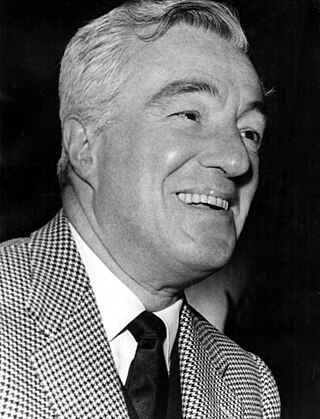
Vittorio De Sica was an Italian film director and actor, a leading figure in the neorealist movement.
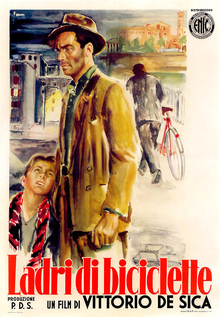
Bicycle Thieves, also known as The Bicycle Thief, is a 1948 Italian neorealist drama film directed by Vittorio De Sica. It follows the story of a poor father searching in post-World War II Rome for his stolen bicycle, without which he will lose the job which was to be the salvation of his young family.

Miracle in Milan is a 1951 Italian fantasy comedy film directed by Vittorio De Sica. The screenplay was co-written by Cesare Zavattini, based on his novel Totò il Buono. The picture stars Francesco Golisano, Emma Gramatica, Paolo Stoppa, and Guglielmo Barnabò.
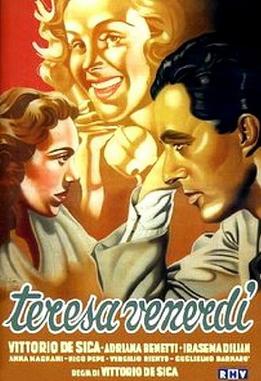
Teresa Venerdì is a 1941 Italian "white-telephones" comedy film directed by Vittorio De Sica. It is a remake of the Hungarian film Rézi Friday.
Questi ragazzi or These Children is a 1937 Italian "white-telephones" comedy film directed by Mario Mattoli.
Triumph of Love is a 1938 Italian comedy film directed by Mario Mattoli and starring Paola Barbara, Vittorio De Sica and Giuditta Rissone.
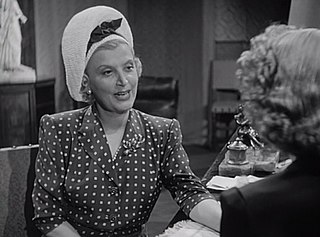
Giuditta Rissone was an Italian film actress who appeared in 25 films between 1933 and 1966. She was born in Genoa and died in Rome. In 1937 in Asti, in the Montferrat region of Piemont she became the wife of actor-director Vittorio De Sica. Her brother Checco Rissone was also an actor.

At Your Orders, Madame is a 1939 Italian "white-telephones" comedy film directed by Mario Mattoli and starring Antonio Gandusio.

Invisible Chains is a 1942 Italian drama film directed by Mario Mattoli and starring Alida Valli, Carlo Ninchi and Giuditta Rissone. It was shot at the Cinecittà Studios in Rome. The film's sets were designed by the art directors Ottavio Scotti and Mario Rappini.

Lost in the Dark is a 1947 Italian melodrama film directed by Camillo Mastrocinque. It was entered into the 1947 Cannes Film Festival. The film was based on a 1901 play of the same title by Roberto Bracco which had earlier been made into a 1914 silent film. The film's sets were designed by the futurist architect Virgilio Marchi.
Everybody's Secretary is a 1933 Italian comedy film directed by Amleto Palermi and starring Armando Falconi, Giuditta Rissone and Vittorio De Sica. The film's sets were designed by the art director Giulio Frati. It features four sketches from the Za-Bum show and was shot entirely on location at the Teatro Argentina in Rome.
Bad Subject is a 1933 Italian comedy film directed by Carlo Ludovico Bragaglia and starring Vittorio De Sica. It is a remake of The Devil to Pay! (1930).
Mr. Desire is a 1934 Italian comedy film directed by Gennaro Righelli and starring Vittorio De Sica.

The Adventuress from the Floor Above is a 1941 Italian "white-telephones" comedy film directed by Raffaello Matarazzo and starring Vittorio De Sica, Clara Calamai and Giuditta Rissone. It was made at the Palatino Studios in Rome. The film was part of the popular White Telephone genre of comedies.

Francesco "Checco" Rissone was an Italian film, stage and television actor.

Departure is a 1938 Italian comedy film directed by Amleto Palermi and starring Vittorio De Sica, María Denis and Giovanni Barrella. It was shot at the Cinecittà Studios in Rome.

The Two Mothers is a 1938 Italian drama film directed by Amleto Palermi and starring Vittorio De Sica, María Denis and Renato Cialente. It was shot at the Cinecittà Studios in Rome. The film's sets were designed by Gastone Medin. It was released in the United States in 1940, and is sometimes dated by that year.

The Cuckoo Clock is a 1938 Italian historical mystery thriller film directed by Camillo Mastrocinque and starring Vittorio De Sica, Oretta Fiume and Laura Solari. It was shot at the Cinecittà Studios in Rome and on location in Livorno. The film's sets were designed by the art director Gino Brosio.
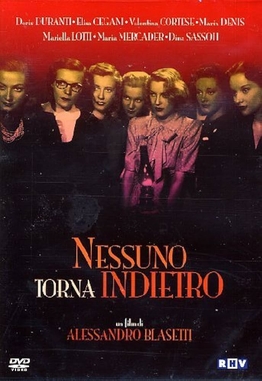
No Turning Back is a 1945 Italian drama film directed by Alessandro Blasetti and starring an ensemble cast including Elisa Cegani, Valentina Cortese, Maria Denis, Doris Duranti, Mariella Lotti, María Mercader, Dina Sassoli and Vittorio De Sica. It is based on the 1938 novel of the same title by Alba De Cespedes. It was shot at the Scalera Studios in Rome. The film's sets were designed by the art directors Guido Fiorini and Carlo Egidi. Made in 1943 during the Second World, due to disruption caused by the fighting in Italy, it did not go on release until January 1945.
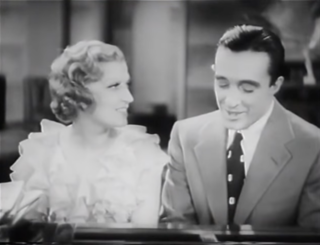
Lohengrin is a 1936 Italian comedy film directed by Nunzio Malasomma and starring Vittorio De Sica, Sergio Tofano and Mimi Aylmer. It was shot at the Pisorno Studios in Tirrenia. The film's sets were designed by the art directors Arnaldo Foresti and Alfredo Montori.















